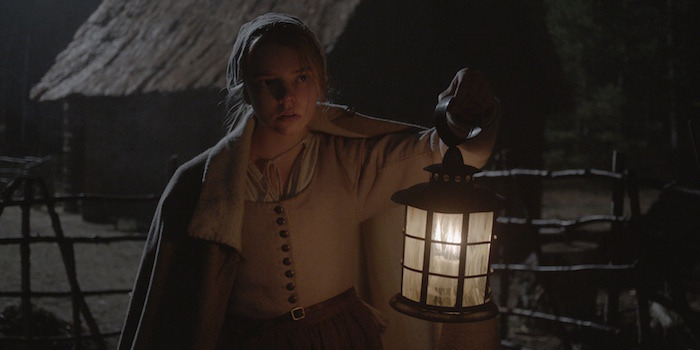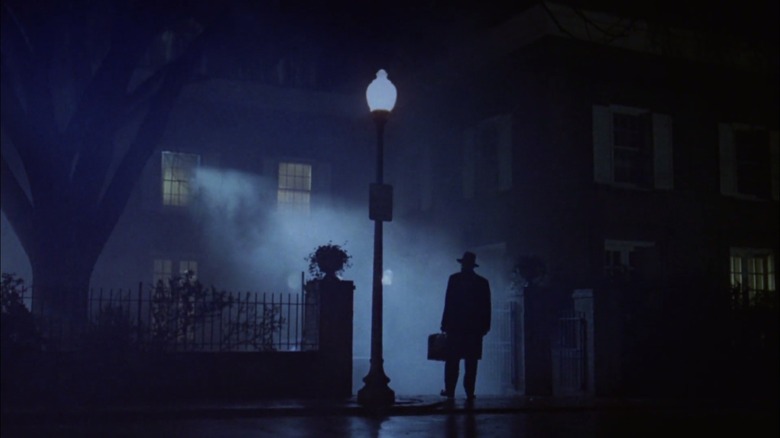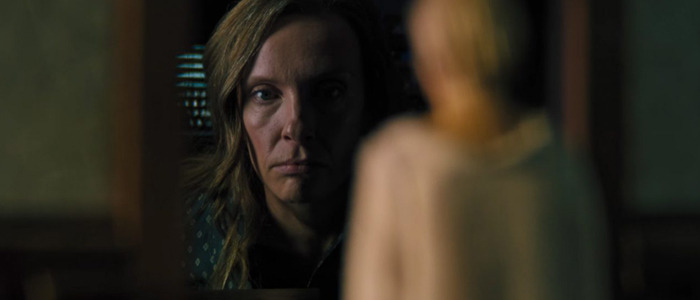There's No Such Thing As An "Elevated Horror Movie" (And Yes, 'Hereditary' Is A Horror Movie)
(Welcome to The Soapbox, the space where we get loud, feisty, political, and opinionated about anything and everything. In this edition: Hereditary has people talking about "elevated horror" again and there is no such thing...there are just horror movies.)
There's an interview going around with Hereditary writer/director Ari Aster that's sparked another round of hand-wringing regarding whether a new horror feature qualifies as a "horror movie" at all; a discussion so tired we might as well feed it a fistful of Roseanne Barr's Ambien in hopes of finally putting it out of its misery. In his talk with ScreenCrush's Britt Hayes, Aster says:
"But even from the beginning, and this is something I've said before but I was kind of careful to never really call it a 'horror film.' The people that were on the crew, or even the people that I was pitching the film to, I would describe it as a family tragedy that curdles into a nightmare."
Even though Aster refers to Hereditary several times during that same chat as a "horror movie", folks have already taken the quote and run with it, questioning whether the unsettling motion picture belongs to this categorization.
Yet this discussion seems disingenuous, as Aster himself admits to loving the genre, and wanting to deliver another brilliant entry:
"I really feel like the horror genre is capable of so much. Especially as an in-theater experience, something you watch with other people. It can do so much. I guess my feeling is that I very rarely see a film that has greater ambitions than to just put the audience on a 90-minute roller coaster. I'm always so excited when I find a film that does have greater ambitions."
So, how do these types of debates continuously crop up, and what do they say about those who engage in them? These are tough questions to ask, as the answers aren't necessarily easy to come by.
The A24 Effect
The Witch became the primary example for this sort of terror sophistry, as fans were upset by its lack of traditional scare set pieces, expecting something more along the lines of Dario Argento's Suspiria, and instead received a portentous, dread-soaked exercise in oppressive New England atmosphere from Robert Eggers. The same thing happened to It Comes At Night – Trey Edward Shults' post-apocalyptic meditation on death and grief that was more interested in performances than monsters or splatter. Both of these films were firmly rooted in the traditions of the genre sandboxes they were playing in, yet opted to use those arenas to tell intensely personal stories instead of delivering simple cheap thrills.
A good deal of blame for this tedious catalogue pedantry falls on the shoulders of the studio itself, as A24 has made a rather recognizable habit out of somewhat misrepresenting movies with an idiosyncratic "art house" bent in their marketing from the label's beginning. Just look to the trailer for Spring Breakers – one of A24's very first releases back in '13 – which sold Harmony Korine's existential, Malickian descent into madness and violence as a titillating T&A fest. The Witch and It Comes at Night were no different, as the spots cut to try and capture audiences outside of festivals for those releases certainly sold a much more traditional brand of horror filmmaking, as opposed to the slow burn indie visions they truly are (see The Witch's trailer here, and It Comes at Night's here).
Rebranding these movies for fans who grew up admiring body count maestros such as Jason Voorhees and Michael Myers – the latter of whom is receiving a revival in the form of David Gordon Green and Danny McBride's direct sequel to John Carpenter's classic Halloween this October – artists and studios have started dropping the descriptor "elevated" in front of motion pictures that fit squarely into the horror genre. Director John Krasinski utilized the term while doing the press rounds for Paramount's sci-fi/horror smash A Quiet Place earlier this year, and Jordan Peele's Oscar-winning Get Out also got slapped with the "elevated" moniker (or "social thriller" – it's more progressive cousin), especially once it became not only a mainstream hit, but a potential Academy frontrunner come March.
But here's the thing: "elevated horror" (or even "social horror", for that matter) doesn't exist. It never did, and it never will. Filmmakers have been attempting to distance themselves from the "horror" label for decades, as it's a genre that's been ghettoized for most of its existence, dominated by cheapie fare that speaks to the basest impulses cinephiles want to vicariously indulge via visceral moving images. Even fright innovators like William Castle and Roger Corman were known more for putting buzzers on seats and re-cutting/titling their movies than they were the actual quality of their output. It's just the name of the game, and it hasn't – and probably never will – change.
A Sense of History
Take William Friedkin, whose blockbuster Satanic possession all-timer The Exorcist has become a widespread comparison point for Hereditary (just as it does whenever the latest "scariest movie of a generation" is unleashed). Reflecting on the '73 monster he minted – thus changing the mainstream's reception of the genre forever (to the tune of $232.9 million domestic, counting the 2000 reissue) – Friedkin maintains:
"I didn't set out to make a horror film. I set out to make a drama about the mysteries of faith."
The French Connection director goes on to say that he's "accepted [The Exorcist] as a horror film", but what changed in the forty-five years since that movie's initial release? Well, one could argue just that: the passage of time is what cemented his picture's position as one of the greatest works of horror ever made. Because no matter how hard an artist or studio try to push their own narratives regarding a piece of art's creation, its continued penetration of social consciousness is truly what ends up writing their legacy. If you asked anyone about Friedkin's film in '18, do you honestly think that they'd refer to The Exorcist as a "drama about the mysteries of faith"? Absolutely not.
In fact, those who choose to use the term "elevated" are tipping their hands regarding their own knowledge of cinema history (or lack thereof). Were it not for German Expressionists such as Robert Wiene (The Cabinet of Dr. Caligari) and F.W. Murnau (Nosferatu), a good chunk of the visual grammar we take for granted in modern movies would be completely absent. Likewise, the Universal Monsters are some of the most widely recognized silver screen icons – the visages of Dracula, Wolfman and Frankenstein probably easier to finger for the public than most of the American Presidents. Though it helped gave birth to the often vilified '80s "slasher" boom (a crassly commercial period that significantly contributed to the bastardization of horror), Alfred Hitchcock's Psycho is still viewed as one of the great filmic landmarks, thanks to its carefully constructed aura of suspense and vicious depictions of onscreen violence.
During the late '60s, up through the '70s, horror and exploitation films were also the low budget fictional arenas where disgruntled young creatives could express their discontent with the status quo. A heavy influence on Get Out, Night of the Living Dead cast a black man as the lead, and then used his character to comment upon the age's ingrained racism (a bit of social messaging that was arguably a happy accident*, that Romero then leaned into with his zombie sequel, Dawn of the Dead). The Texas Chain Saw Massacre and Last House On the Left saw their architects – Tobe Hooper and Wes Craven, respectively – using handheld cameras to transmute images transmitted from Vietnam into drive-in and 42nd Street screams of defiance. John Carpenter's Halloween let us know that evil could invade even the whitest "safe space": suburbia.
After lacerating our psyches, these maverick DIY auteurs were then using the opens wounds to tattoo their agendas onto our brains, ensuring that we didn't just walk out of the theater terrified, but with our consciousnesses completely transformed. They forewent elevation and went straight for enlightenment.
What the "elevated" adjective also ignores is the fact that, along with action movies and musicals, horror may be one of the purest forms of cinematic expression that the medium has ever seen. It's easy to forget that motion pictures began with magicians like George Méliès taking their tricks and performing them in front of rolling cameras, creating illusions that transported audiences and allowed them to experience sensations that they might never have the chance to endure during their everyday existences. With horror, viewers are mainlining the adrenaline rush of potential death, vicariously ingesting brushes with the great beyond, many times at the hands of bloodthirsty monsters and maniacs. It's a dopamine drip of dread that rivals the fluidity of song and dance, and the "storytelling through violence" that defines those aforementioned rivals. In essence, watching a horror movie is getting back to the basics of cinema itself: the illusion of omnipresent "danger", even when you're safely seated in an air-conditioned auditorium.
There's also this misconception that, just because a horror movie isn't "scary", it no longer belongs to the genre. This misconception is preposterous, as it ignores the work of midnight mavens like Joe Dante, who are simultaneously going after audiences' funny bones with movies like Piranha, Gremlins and The 'Burbs. Similarly, pictures such as M. Night Shymalan's The Sixth Sense become supernatural tearjerkers, mixing in heart-wrenching pathos with their spooky ghost stories. Even Steven Spielberg's Jaws is as much a swashbuckling sea adventure as it is the qualitative epitome of the "animals attack" subgenre. There's this baffling notion that horror cinema can only evoke one emotion; an utterly myopic reduction of both the form and its creators' power that again is more revealing about those who hold that opinion than the movies themselves.
Evolving Past “Elevated”
In fairness, the "elevated" tag is needed when trying to convince certain financiers and performers behind the scenes when trying to get a project off the ground. Horror's perceived stigma is often too great to overcome for some producers, and trying to sell these personal visions is undoubtedly a chore and a half for those attempting to obtain financing, so that great movies such as Hereditary can even get off the ground. Aster himself admits to using somewhat obfuscating language to execute his vision, placing the quote that kicks this piece off in the context of what he'd say to crew members and moneymen.
To wit, it's difficult to fault the players when the game is sometimes rigged for them to fail from the start.
Nevertheless, it's not going to be audiences, critics, or even filmmakers who end up defining what these movies are called ten, fifteen, twenty, or even fifty years in the future, but the pictures themselves. "Elevated horror" will eventually be replaced by another term that individuals toss out when trying to place their work above the gore-soaked cheap thrill fold. However, the truly great ones that capture our imaginations for generations to come will earn the moniker and respect they deserve, because they've left a mark on the individuals who brave their fright-filled visual narratives. Horror movies are forever, no matter how badly the genre is condescended or skirted around by those crafting its next big entry. It'll remain a dark playground for some of our most talented individuals; producing stars both in front of and behind the lens.
Perhaps an "honesty is the best policy" regulation should be implemented as we continue to discuss these works. Every movie has a point of view, and the modern mode of watching motion pictures – in which we often try to bend the text to our own preconceived belief structures – should be thrown out the window entirely. We should allow cinema – regardless of content or genre – to exist as it is, as opposed to what we want it to be. To approach any work of art in another fashion seems not only fraudulent, but frankly somewhat sinister in its attempts to warp and muddy the proverbial waters to our own liking.
Movies aren't what you want them to be; but rather living acts of representation. Trying to rebrand cinema as you see fit is a selfish way of approaching any medium, especially one whose entire history has been built on the notion of seeing the world through another's eyes, irrespective of how terrifying that experience may be.
*Romero always admitted that they cast Jones not because he was black, but because he was the "best actor we knew".



